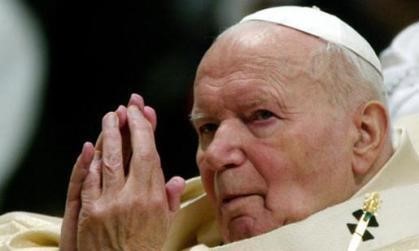Isaiah speaks of “putting water in the wilderness to give the chosen people drink. The people I formed for myself will sing my praises.” Paul, writing to the Philippians, speaks of wanting perfection, not from the Law  but through faith in Christ. He says that because of Christ everything else is rubbish. And then we have the woman caught in adultery who experiences firsthand the wrath of those who follow the Law above all else. Upon meeting Jesus she encounters his mercy and compassion and the gift of faith.
but through faith in Christ. He says that because of Christ everything else is rubbish. And then we have the woman caught in adultery who experiences firsthand the wrath of those who follow the Law above all else. Upon meeting Jesus she encounters his mercy and compassion and the gift of faith.
I believe that, once, we Catholics were people of the law, and now we are attempting to discover what it means to be people of faith. Interestingly, I think that over the past 25 years, those responsible for the diocese have been attempting to struggle with what it means to live as real people of faith. Our Diocesan Pastoral Plan outlines ten theological principles which aim to assist us to be people who live the life and mission of Jesus in communion with others. The law serves to help us, but it is not the key ingredient of living a good life. Of course we have people around us who love the law and like to live strictly in its precepts, and there are others who debunk it. The law has its place, and its place is to serve the community of believers.
In the diocese currently we are attempting to balance the many legislative requirements of Civil Law while being very mindful of Canon Law. So it was good to come across the following words this week.
Pope John Paul II, now Saint, in his Apostolic Letter Novo Millennio Ineunte of 2000 stated,
It is not therefore a matter of inventing a "new programme". The programme already exists: it is the plan found in the Gospel and in the living Tradition, it is the same as ever. Ultimately, it has its centre in Christ himself, who is to be known, loved and imitated, so that in him we may live the life of the Trinity, and with him transform history until its fulfilment in the heavenly Jerusalem. This is a programme which does not change with shifts of times and cultures, even though it takes account of time and culture for the sake of true dialogue and effective communication. This programme for all times is our programme for the Third Millennium.
But it must be translated into pastoral initiatives adapted to the circumstances of each community. The Jubilee has given us the extraordinary opportunity to travel together for a number of years on a journey common to the whole Church, a catechetical journey on the theme of the Trinity, accompanied by precise pastoral undertakings designed to ensure that the Jubilee would be a fruitful event. I am grateful for the sincere and widespread acceptance of what I proposed in my Apostolic Letter Tertio Millennio Adveniente. But now it is no longer an immediate goal that we face, but the larger and more demanding challenge of normal pastoral activity. With its universal and indispensable provisions, the programme of the Gospel must continue to take root, as it has always done, in the life of the Church everywhere. It is  in the local churches that the specific features of a detailed pastoral plan can be identified — goals and methods, formation and enrichment of the people involved, the search for the necessary resources — which will enable the proclamation of Christ to reach people, mould communities, and have a deep and incisive influence in bringing Gospel values to bear in society and culture.
in the local churches that the specific features of a detailed pastoral plan can be identified — goals and methods, formation and enrichment of the people involved, the search for the necessary resources — which will enable the proclamation of Christ to reach people, mould communities, and have a deep and incisive influence in bringing Gospel values to bear in society and culture.
I therefore earnestly exhort the Pastors of the particular Churches, with the help of all sectors of God's People, confidently to plan the stages of the journey ahead, harmonizing the choices of each diocesan community with those of neighbouring Churches and of the universal Church (paragraph 29).
While our Vision and Mission are of God, revealed in the person of Christ, we are called to articulate how we will enact this vision, via a mission, that is relevant to our time and place. As Pope John Paul II indicated, we have no option but to articulate to everyone how we are confidently planning the stages of the journey ahead.
It seems to me that in this diocese we are serious about trying to create pastoral initiatives for the people of our diocese. We have just celebrated Catholic Schools Week, and over the coming week here are many opportunities for people to grow in their faith with each other:
- Be, Grow, Show, Retreat for young people is on next weekend.
 Saturday 19th March – the Feast of St Joseph and the 150 year anniversary of the founding of the Sisters of St Joseph by Fr Julian Tenison Woods and St Mary MacKillop. A special Mass will be held at Our Lady of Victories, Shortland at 10.30am.
Saturday 19th March – the Feast of St Joseph and the 150 year anniversary of the founding of the Sisters of St Joseph by Fr Julian Tenison Woods and St Mary MacKillop. A special Mass will be held at Our Lady of Victories, Shortland at 10.30am.- Saturday 19th March – Earth Hour in which people are encouraged to take care of our environment and to switch off all power between 8.30 and 9.30pm. Pope Francis in his Encyclical Laudato Si’ encourages us to live in harmony with the environment and all inhabitants of our planet.
- Sunday 20th March – Palm Sunday and the annual Ecumenical Way of the Cross at Kilaben Bay commencing at 3.00pm. Each year people from across our diocese gather to remember Jesus’ journey and our own journey of suffering, death and resurrection. This is a great way to begin Holy Week.
- Tuesday 22nd March – Chrism Mass at the Cathedral at 7.00pm. This is a great celebration of the priestly ministry of all the baptised but most especially our ordained clergy. I would have to say that this is the greatest experience of the faith of God’s people in our diocese.
- Missionary of Mercy, Fr Richard Shortall SJ, at Beresfield and then at Kilaben Bay for the weekend.
- Project Compassion invites us to give generously so others may ‘learn more and create change’. Caritas aims to end poverty, promote justice and uphold dignity.
I am sure that in your parishes there are many pastoral initiatives as well which are planned to assist the faith formation of the people we serve.
I must admit to feeling disheartened when I realise all that we offer to enable the proclamation of Christ to reach people, mould communities, and have a deep and incisive influence in bringing Gospel values to bear in society and culture. I would love people to become more aware, listen and engage. I have to be patient and wait for God’s time and place.
Happy journeying to Easter and I hope to see you at some of our pastoral faith encounters.

